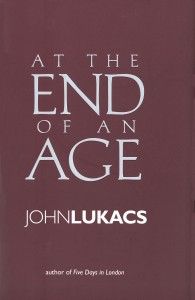From the Highlighter. Lukacs II

At the End of an Age, John Lukacs (Yale, 2002).
The first part ran on Monday.
| “[T]here is a duality in every human life, in every human character.” p. 4. |
Don't worry, Lukacs is Catholic, not Manichean. His point is well-taken, and anyone with an ounce of honesty knows is observation is an aphorism. Indeed, “duality” is a reserved way to put it. At times, I swear my human character could be broken into four, eight, maybe a dozen parts . . . and not parts that are then easily re-categorized into just two big categories. They battle each other like Cadmus' men. But whether it's “dual” or “legion,” we are called to take on one nature . . . disposition, attitude, goal: That of love. The people who come closest, we refer to as “saints.”
_____
Another example that, at the end of the age, the former labels simply don't fit anymore:
| “A great division among the American people has begun–gradually, slowly–to take shape: not between Republicans and Democrats, and not between 'conservatives' and 'liberals,' but between people who are still unthinking believers in technology and in economic determinism and people who are not.” p. 43 |
Ah, yes, but I think pretty much everyone in Washington, D.C. is now a technocrat. Everyone there thinks we just need more government–wielding its technological weapons and scientific studies–to do everything. The great division among American people might be: Those inside the Beltway and those outside of it.
_____
| “Historical thinking accords with the recognition that human knowledge is neither objective nor subjective but personal and participant.” p. 60. |
I'm slow on many things, but I realized years ago that the whole “nature v. nurture” debate arena was empty. It seemed obvious to me as a young man that answers to the greatest human questions couldn't be broken into an exclusivist duality. Years later, I was exonerated by the rise of John Paul II's personalist philosophy. Thing is, I think pretty much everyone my age intuited the same thing I did.
_____
| “People do not have ideas. They choose them.” p. 69, fn. 16. |
Amen. And for that reason, I've always considered it fortuitous–a stroke of amazing good luck–when I've stumbled upon a book that both resonates with me and turns out to be true.
_____
A passage that gives one pause:
| “Traditionalists . . . do not love [the past]; they want it to be not past but present.” p. 83, fn. 28. Quoting Ortega y Gasset. |
_____
| “[W]hat men want to be is often even more important than what they 'are.'” p. 172. |
This rings so true, I'm not sure it needs much comment, except to note that the passage undercuts itself. The only reason it might be true is because the desire influences what they will be. One's actual existence always trumps the imaginary. But what we imagine could have an impact on what we eventually are . . . hence the poignancy of the passage. Luckacs, incidentally, is referring to the impact on others: Because Mr. X wants to be the man who re-makes man in Mr. X's image, the rest of us suffer.
Other passages:
| “[T]he mind has functions that the brain hardly knows.” p. 136. “[I]t is more difficult to wrestle with a weak mind than with a strong one.” p. 136, fn 43. “Whereas the idea of equality is rooted in the strength of the superpersonal idea of justice, the demand for uniformity is rooted in the meanness of the personal sting of envy.” p. 140. Quoting Owen Barfield. “What matters is not what ideas do to men but what men do to their ideas; how and when they choose them, and how and why they accommodate them to their own wishes, interests, lives, circumstances.” p. 141. “There are evil men who would be less dangerous if they had no good in them.” p. 157. Quoting La Rochefoucauld. |
One final:
| “A man may swear to tell the truth, but it is not in his power to tell the whole truth and nothing but the truth.” p. 200. Quoting Pierre Duhem. |
If anyone doubts this, he has never gone back and thoroughly analyzed his words from even the simplest conversation. It's enough to make the wisest men grow silent.
But of course, I keep typing.
